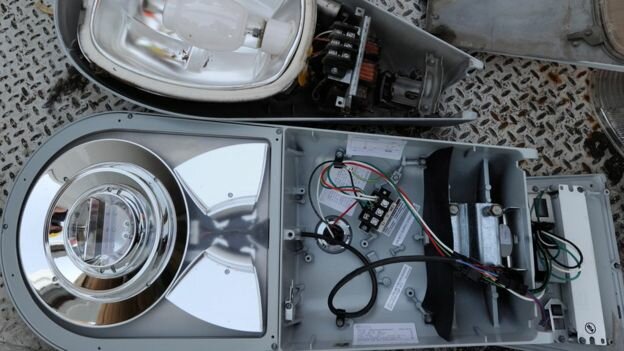‘LED street lights are disturbing my sleep’
By BBC
In towns and cities across the world, the colour of night is changing. Traditional yellow sodium street lights are steadily being replaced by white LED lamps. The new lights use less energy, dramatically cutting carbon emissions and saving money. But not everybody is happy.
“When the leaves left the trees and I tried to sleep, I turned to one side and the light’s shining right in my eyes.”
Like most of us, Karen Snyder had never really paid much attention to street lights. But that all changed last year when the city council began installing LED lights outside her home in a quiet corner of Washington DC.
In addition to the light shining into her bedroom, the 63-year-old teacher’s guest room, where she watches TV, is now bathed in something akin to strong moonlight.
“It’s like there’s a ray coming in. Like a blue ray. Right directly on to the couch. If you are sitting down, the moon would be above the house and you’d get the beautiful feel of the moon. This is shining right in your eyes so it’s pretty different than a moon. Moons don’t go this low into the windows.”
Her friend, Delores Bushong, says her sleep has also been disturbed by the LED street lights outside her home, and is now one of the main opponents of the new lighting in the city. She fears they will ruin the atmosphere on her back porch, where she likes to relax after dark in a hammock in the sweltering summer months.
“In some kinds of torture they put a light on someone’s face all the time,” she says. “Am I going to be subjected to a kind of torture forever? It doesn’t make sense to me. Just because we have a new technology and you can save money.”
Bushong has become well-versed in the jargon of colour temperature (measured in degrees Kelvin) and light intensity (measured in Lumens), as she battles to get the city to take her concerns seriously. At the very least, she wants the 4,000-Kelvin bulbs in her neighbourhood, which she compares to the harsh lighting in a prison yard, to be replaced by bulbs with lower Kelvin ratings, closer in look and feel to the old high-pressure sodium bulbs.
The city insists it is listening to her campaign group’s concerns but there is no turning back the march of the LEDs.
“There are many reasons why cities are switching to LED lights,” says Seth Miller Gabriel, the director of Washington DC’s Office of Public Private Partnerships.
“One, not be looked over, is cost – 50% or more over the life cycle of this new light. The lights last a lot longer. So we save electricity, by at least 50%, we save on the maintenance costs and we get a better lighting solution.”
Then there are the environmental benefits: “We estimate that in the District of Columbia by switching our 71,000 street lights over to LEDs we can save upwards of 30 million pounds (13,600 tonnes) of coal a year, in electricity we won’t be using for the lights,” he says.
Miller Gabriel argues that many city-dwellers are blundering around in neighbourhoods that have never been properly lit, allowing crime to fester in the shadows. He dreams of a world where every street light is an LED. He may live long enough to see that happen.
About 10% of America’s street lights have so far been converted, but the Department of Energy has estimated that if the whole country switched to LEDs over the next two decades it would save $120bn over that 20-year period.
Cities across Europe and the Asia Pacific region are going down the LED route and, in China, the central planning agency is in the middle of a conversion programme it expects will cut annual carbon emissions by 48 million tonnes.
Against these sort of statistics, those campaigning against LEDs can sound like Luddites, railing against scientific progress, but they insist they have a strong case.
They point to a recent report by the American Medical Association (AMA), which warns that the blue light emitted by first generation high-intensity LEDs, used in many cities around the world including New York, can adversely affect circadian sleep rhythms, leading to reduced duration and quality of sleep, “impaired daytime functioning” and obesity.
The AMA report calls on cities to use the lowest-intensity LEDs possible and shade them better to reduce glare, which it warns can also harm wildlife.
Seth Miller Gabriel says the report does not contain original research and is “more of a literature review of what’s been published elsewhere”.
“We would really like to see more concrete evidence of what’s going on with these lights,” he says. “If it’s really a problem, based on a particular intensity of lights, we want to know that. That AMA report really didn’t give us the kind of hard data we would need [on which] to base a large scale procurement.”
He is overseeing the tendering process for the next phase of Washington’s LED conversion which he promises will be done in a more sensitive way, with lower Kelvin ratings, better shading and remote controls, so that lights can be dimmed or increased in intensity at different times to suit the needs of particular neighbourhoods.
But he adds: “Let’s be honest, humans are not engineered for change. So when we come home and see a different light. Even if it’s a much better light, there’s going to be a reaction – ‘Oh my goodness, it’s a different light, what happened?'”
It is true that many of the same arguments being made against LED lights were heard in the early 1970s, when cities were converting to the yellow sodium lights we are so familiar with today.
High-pressure sodium bulbs used less energy than the mercury vapour bulbs they replaced. But some campaigners, most notably a Vancouver-based artist called Ralf Kelman, argued at the time that their “antiseptic orange” glow was too bright and would damage growth in young trees, as well as blocking out the stars in the night sky.
The light pollution argument has also been used against LEDs, although some researchers say that properly directed, they could dramatically improve the visibility of stars.
But, for some people, the debate goes beyond dry arguments about Kelvin ratings, light pollution and carbon emissions and touches on questions about the quality of life city-dwellers should expect.
“When the lighting is right you have a sense of peace and contemplation, of aesthetic joy in the world,” says novelist Lionel Shriver, who is campaigning against LEDs in the South Brooklyn neighbourhood where she spends part of the year.
“I am not someone who believes she can stand in the way of the march of the LEDs. The savings in energy are too great. The savings in money are too great. And if we just say ‘but it’s not pretty’ that’s not going to stop these things.
“The truth is that the technology of LEDs has advanced fantastically so that it is no longer necessary to make a stark choice between economy and the environment and aesthetics. You can have both.
“What is going on in some cities, in New York especially, that is what I am most familiar with, amounts to a kind of widespread civic vandalism.”





